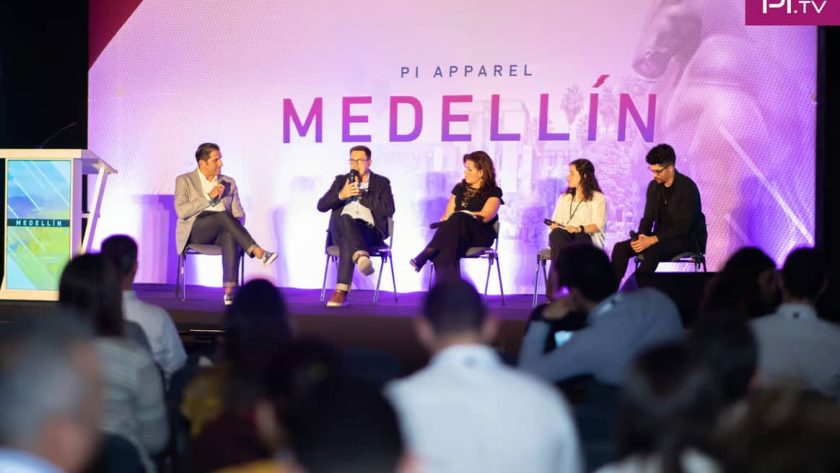Amid the marbled floors and plush of Medellín’s International Hotel in El Poblado, key brands, retailers, and manufacturers from the US and South America came together on Wednesday and Thursday to attend the latest edition of PI Apparel Medellín.
Surrounded by the Andes mountains, palm trees, and plenty of sunshine, the venue was the ideal backdrop for the second edition of the conference, as professionals dressed in suits, flowery dresses, and linen suits trickled in with coffee in hand to learn more about what technologies and practices are poised to shape the face of the Colombian fashion industry today.
Walking into the main hall, the theme of this season’s conference was immediately evident – how new technologies are disrupting production and supply chains within the fashion industry. Throughout the event, attendees explored Latin America’s fashion industry’s digital evolution through stands like CLO, leading 3D design software, and Swatchbook, a cloud-based material platform. Insightful talks by industry leaders such as Tiffany Radon from Carhartt and Isaac Korn from Perry Ellis International further illuminated the impact of emerging technologies and their potential for fostering global collaboration
PI Apparel Medellín: Where fashion meets innovation
With several American delegates flying in Tuesday night to attend the conference, it comes as no surprise that Colombia has been earmarked as the next big nearshoring hub for the US. Local textiles and apparel industries contribute to approximately 7.7 percent of Colombia’s industrial GDP, with the sector witnessing impressive growth in recent years. Innovation is playing a key part in the sector’s growth, reflected in Fabricato’s latest fabric. A leading textile manufacturer based out of Bello, the company managed to avoid closing down for good in 2017 and is now investing in new, innovative fabrics that are in line with current industry and consumer trends.
During PI Apparel, Francisco Mejia Azcarate, a textile consultant from Fabricato, unveiled the company’s latest innovation – a fabric made with pineapple leaf fiber obtained from local pineapple waste. A comparable offering to linen, Fabricato’s new cotton and pineapple fabric is made from pre-consumer and post-consumer waste and garnered much attention from local brands and questions during the two-day event. “The country’s more than 100 years of tradition combined with state-of-the-art technology, innovation, and sustainable, environmentally friendly practices are just some of the characteristics that demonstrate the strength of our textile industry, making Colombia a benchmark in design, production, and distribution,” said Carmen Caballero, president of ProColombia, a government agency from the executive branch of the government of Colombia in charge of promoting Colombian non-traditional exports in a statement.
Colombia poised to become next nearshoring hub for the US
Looking to build on the strength of the local textile industry, Clothing Tech, an Austin-based software startup that harnesses pioneering 3D technology to transform the garment design and sales process, was among the exhibitors. “We’ve had a lot of success attending events like this, building key relationships, and making new contacts in the industry,” said Mark Goblirsch, chief commercial officer at Clothing Tech, during the event. “Our company’s founder, William Wilcox, is not from the fashion space. Our company was not rooted in fashion, so we go to events like this to build those bridges and see what other innovations are on the market.”
Part of a joint venture with Hexagon and other investors, Clothing Tech’s software can drastically reduce the timeline from product concept to production while offering customers a virtual try-on experience via web or mobile platforms using 3D technology. Primarily looking to connect with smaller brands that can really benefit from leveraging 3D design across their entire operations or larger, well-established brands who would be interested in implementing their software across one to two categories, to begin with, such as men’s trousers or women’s skirts, Goblirsch is positive with the outcome of the PI Apparel, and the Clothing Tech’s ongoing growth in new markets. “We’ve had a lot of interest from brands local and internationally and been praised with positive reception so far,” adds Wilcox.
Networking, levering innovation, and supply chain partners are key at PI Apparel Medellín
Speaking with other attendees, it seems that the sentiment is universal. “This is my first time at PI Apparel Medellín, but I have given a few talks and attended a few PI events in New York. It’s always very exciting to attend the conference, as each event draws different types of people from the industry,” said Dr. Pat Truman, president of Global Garment Engineering, to FashionUnited. Hosting a talk on the second day of the conference on How to find your waist on a 3D avatar and what it is important, she sees PI Medellín as a unique opportunity to cultivate deeper connections with others.
“This event is smaller than others in the US; there are few exhibitors, but the ones that are here are very good. The stands are clearly marked, and I’ve been able to meet and talk with a lot of people. I think that’s why people come, to network. It’s also interesting to learn what others are doing through the presentations – but the big draw for me is meeting people in person,” she added.
Swatchbook, one of the exhibitors who has been attending PI Apparel events around the world since 2018, agrees. A revolutionary cloud platform that redefines material sourcing, development, and sharing, the founder and CEO Yazan Malkosh shares with FashionUnited that not many other events bring digital into the fold like PI Apparel. “This is the first time we are attending a PI Apparel event in South America. It’s been great assessing the crowd and learning about where they are in their digital transformation journey.” Looking to leverage their platform to help local manufacturers and brands, Malkosh sees Colombia as an untapped market and is eager to assist local brands and manufacturers who are looking to expand globally. “This is an opportunity for us to plug them in with our current large-scale clients like Target or New Balance and help them grow.”



